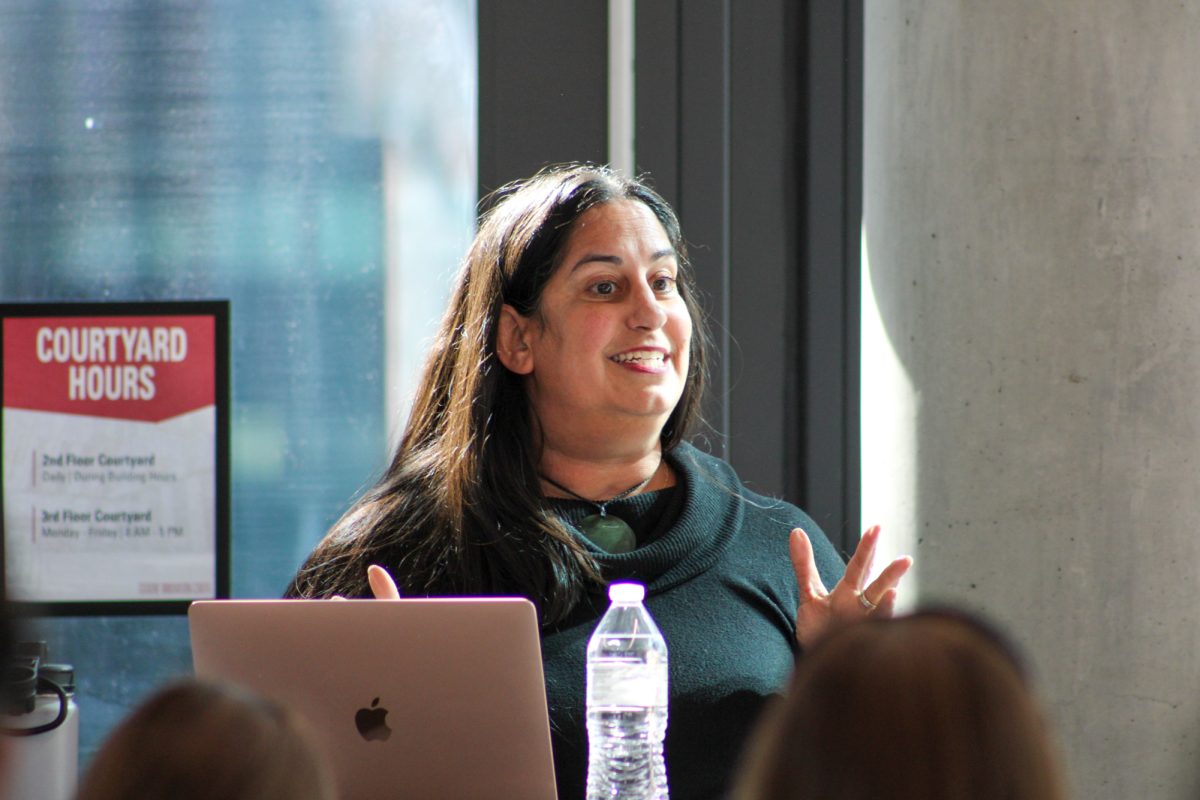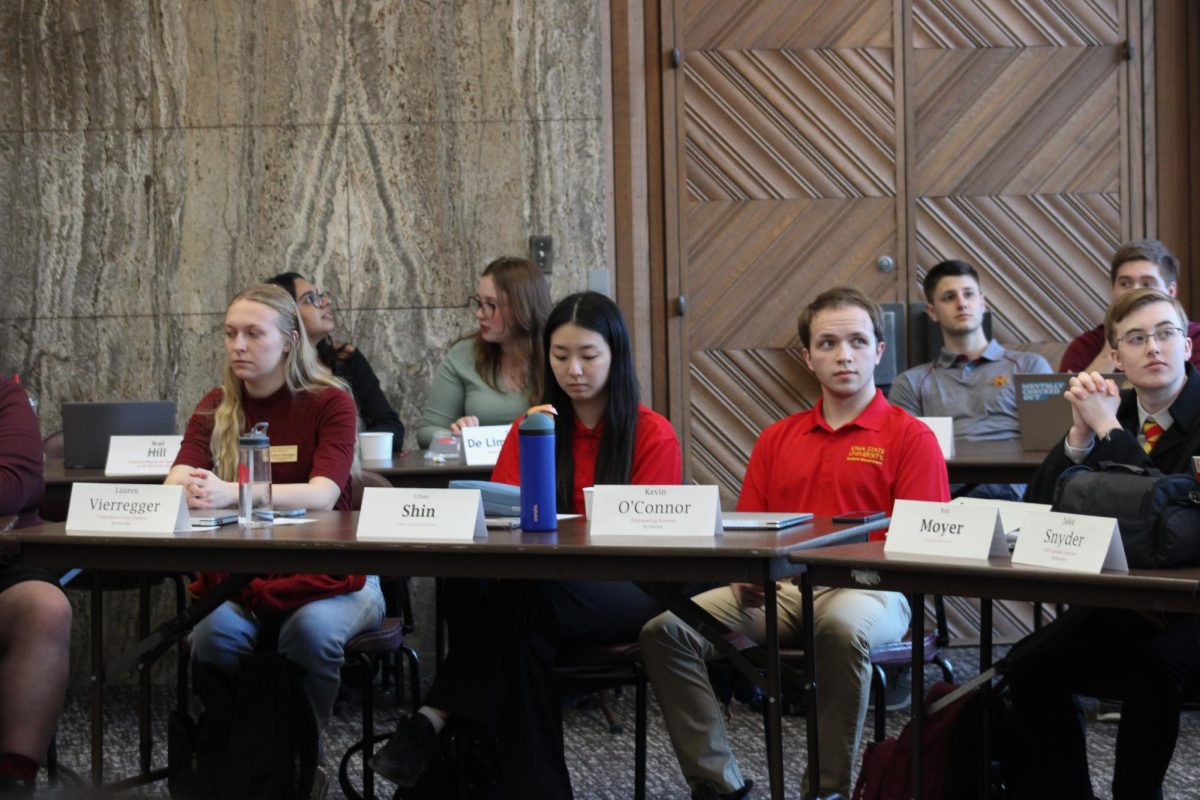Tyrrell: Advice for studying abroad
Jordyn DuBois/Iowa State Daily
Chase Kaltve, senior in biology, learns about study abroad opportunities offered through Iowa State. The study abroad center has over 700 different opportunities students can take advantage of. The Study Abroad Fair was held in the Great Hall of the Memorial Union on Jan. 24 and allowed students to ask questions and learn more about these opportunities.
July 15, 2019
I had a pretty sad realization this week.
I spent my last semester of school studying abroad at the University of Limerick in Ireland. It appears that, despite my best efforts, I’ve officially exhausted my sources of new people who are curious about my semester abroad.
However, there are plenty of people curious about studying abroad who I’ve never even met, so now I’m writing an advice column about it so I can talk some more.
Before I dive in, my advice comes with a caveat: The whole purpose of studying abroad is to learn in a new and different way. You learn about yourself, about travel, about other people and cultures and comfort zones. If you don’t make any mistakes along the way, you just might miss the whole point.
If you haven’t chosen your university yet, you first need to realize that you basically have two options for what type of study abroad experience you want. You can either choose a country and spend the majority of your time there, immersing yourself in the culture and traveling mainly within its borders, or you can pick a country strategically located so that you can visit many countries within one trip.
There are benefits to both types of semester. You might never again spend such an extended period of time living in another country, and taking advantage of that to make friends in your new country, immerse yourself in the culture and get involved with your university will certainly make for a unique experience. I learned while I was in Ireland that this is how European students view their study abroad semesters — they tend to travel only within the confines of their new country, making friends with other international students and really soaking in the culture of their new university.
You’re more likely to have the first kind of experience if you go to countries like New Zealand, Australia, China or any African country. On the other hand, study abroad in any European country and you’d be a fool not to take advantage of the insanely low plane tickets. I was able to squeeze in 13 countries in my semester and never spent more than $80 on a plane ticket. So, if you still have time to choose your university, spend some time thinking about what kind of semester you want.
My second piece of advice also involves thinking carefully, this time about whether or not you want to study abroad with friends. I would really strongly advise you not to. I went to Ireland with 21 other Iowa State students, but I barely knew any of them before going, and my closest friends ended up being from universities in North Carolina, Rhode Island and Minnesota.
I didn’t study abroad because I wanted to travel with people I already knew well; I wanted to become friends with people I never would’ve met otherwise and doing so pushed me out of my comfort zone, broadened my perspective on people in general and allowed me to form lasting friendships with brand new people. But maybe what you want out of your semester is to make some incredible memories with your best friends from college. Ultimately, you need to consider what you want and base your choice on that.
In the same vein, something even more important: Don’t let your relationship hold you back.
Being apart from your significant other for a whole semester is hard, hard work. I studied abroad at UL this spring, and my boyfriend was there for the fall semester. As much as it sucked to be apart for so long, I am so grateful that I didn’t miss the coolest semester of my life to be with him, and I’m so glad he didn’t do the same. We each got to gain all the benefits of study abroad and have our own unique experience, and luckily, it worked out for us.
Of course sometimes it doesn’t work out. But if you break up because of your semester apart, then you were probably going to break up eventually anyway, and wouldn’t you rather have gotten to experience that amazing semester abroad in the meantime?
My last two pieces of advice go hand in hand: First, plan your trips. Whether you’ll be country hopping all semester or just traveling within the same country, you can save a LOT of money and inconvenience by planning in advance. I know at least three different people who wasted $60 checking into their Ryanair flight at the airport rather than online because they didn’t do their research ahead of time. When I was traveling from Prague to Salzburg with two friends, we accidentally got on a high-speed train we didn’t have tickets for because we didn’t read the fine print before we left. That was an $80 mistake. Not everyone loves planning, but trust me, it is vital when you’re traveling.
However, it’s also important to leave some room for spontaneity. Some of my best memories from last semester — staying up all night hopping clubs in London, swimming in a 42 degree lake in Austria, hiking through the German — wouldn’t have happened if I hadn’t relinquished control of the plan and let someone else take charge. The balance between planning and spontaneity is a tricky one to strike but it’s truly one of the most important things you’ll learn in your semester abroad.
Those are some of the most important things I think you should know before studying abroad, but believe me: I have plenty more where that came from and no desire to stop talking about the subject, ever. Right now I might just be an obnoxious study abroad student to you, but you’re in for a rude awakening: When you get back from your travels, I guarantee you will be just like me.
There’s a reason why people can’t stop talking about their semester abroad. Getting to travel across the world will — most likely — never be so inexpensive, easy and memorable again. What are you waiting for?







